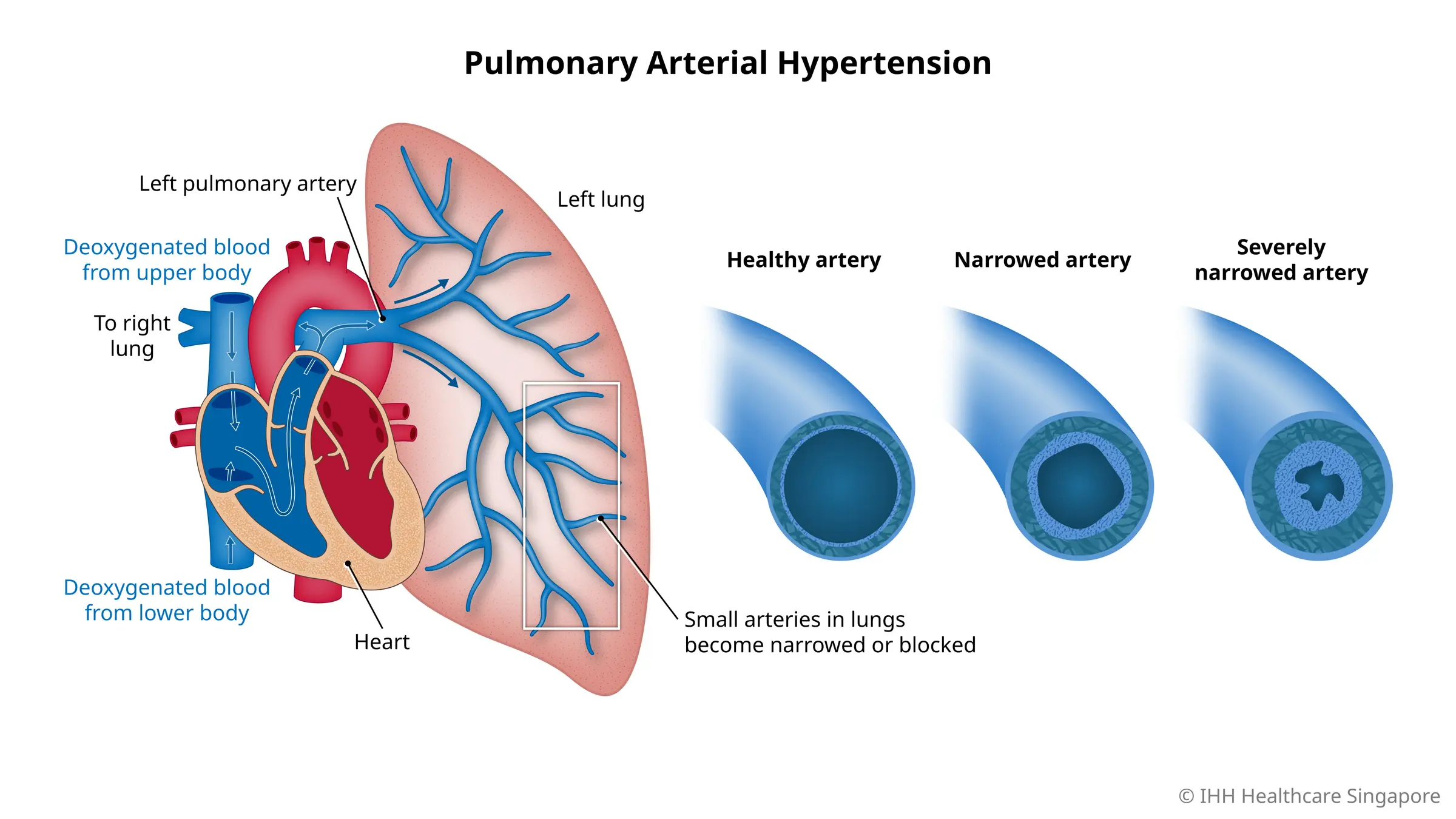-
-
Featured Care Areas

Pulmonary Arterial Hypertension
What is pulmonary arterial hypertension?
Pulmonary hypertension is a type of high blood pressure in the blood vessels, leading from the heart to the lungs.
Pulmonary arterial hypertension is a specific form of pulmonary hypertension where the small arteries in the lungs become narrow or blocked. This makes it harder for blood to flow through them, causing blood pressure in the lungs to increase. The heart also needs to work harder to pump blood through the lungs, which can weaken heart muscles and cause heart failure. It is a rare condition that slowly gets worse and can be life-threatening.
Stages of pulmonary hypertension
Doctors classify pulmonary hypertension into 4 stages, with mild to severe symptoms:
- Stage 1 — You do not experience any symptoms, even during physical activity.
- Stage 2 — You do not experience symptoms at rest. However, you may experience fatigue, shortness of breath or chest pain during activity.
- Stage 3 — You may feel some symptoms at rest, but they are not severe enough to make you uncomfortable. The symptoms are more apparent when you engage in physical activity.
- Stage 4 — At this stage, you have severe pulmonary hypertension which disrupts your daily activities. Your symptoms occur both at rest and during physical activity. You are also easily exhausted.
What are the symptoms of pulmonary arterial hypertension?
In the early stages, you may not notice any symptoms. As the disease progresses, you will start to experience symptoms such as:
- Fatigue
- Chest pain
- Dizziness or fainting spells
- Increased shortness of breath, initially while you are exercising and eventually even when you are at rest
- Edema, or swelling of your ankles, legs and eventually your abdomen and neck
- Racing pulse or heart palpitations
- Your lips and skin turning bluish
What causes pulmonary arterial hypertension?
The causes of pulmonary arterial hypertension depend on the type of pulmonary hypertension involved:
Idiopathic or primary pulmonary hypertension
The cause of idiopathic or primary pulmonary hypertension is unknown.
Secondary pulmonary hypertension
Secondary pulmonary hypertension is linked to known risk factors and underlying diseases such as:
- Congenital heart abnormalities.
- Heart and lung disease, which are the most common causes of secondary pulmonary hypertension.
- Exposure to certain drugs, including methamphetamine and cocaine.
- Connective tissue disorders such as scleroderma and lupus.
- Infections from HIV or schistosomiasis.
- Inherited genetic mutation.
- Liver cirrhosis.
What are the risk factors for pulmonary arterial hypertension?
Pulmonary arterial hypertension is a rare condition that can affect anyone. It is more common in women who are 30 – 50 years old.
If you have a family history of the disease, your risk will be higher.
What are the complications and related diseases of pulmonary arterial hypertension?
Pulmonary arterial hypertension can lead to:
- Blood clots developing in the lungs.
- Irregular heartbeats (arrhythmia) which can cause palpitations, dizziness or fainting.
- Weakened heart muscle and heart failure. Increased strain on the heart to pump blood through the lungs can lead to heart failure.
- Pregnancy complications. Pulmonary hypertension can be life-threatening for an expectant mother and her baby.
- Bleeding into the lungs and coughing up blood. This is a life-threatening condition.
This page has been reviewed by our medical content reviewers.
Need help?
For enquiries, please call
+65 6575 7575
For appointment bookings, please WhatsApp
+65 8111 9777



